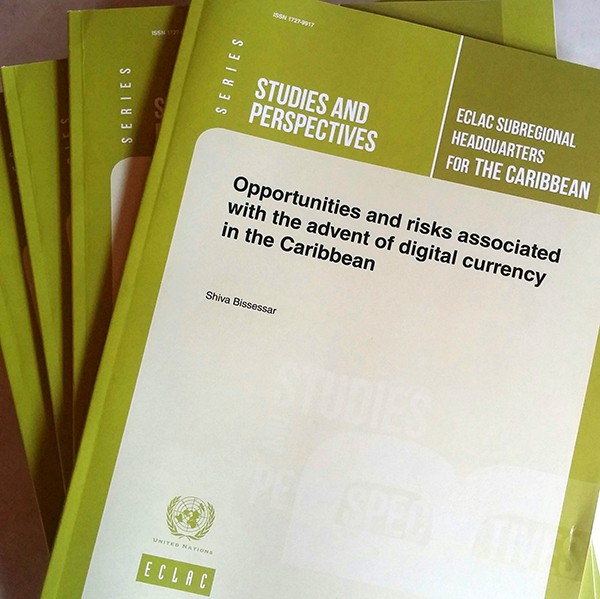

UN Economic Commission for Latin America and the Caribbean (ECALC) Robert Crane Williams, and Peter Nichols, distribute copies of the study at the recent Caribbean Telecommunications Union event, Caribbean ICT Collaboration Forum Photo by Shiva Bissessar
Taking note of longstanding deficiencies in electronic payments systems within some Caribbean territories and the emergence of new innovation in payments systems, the UN Economic Commission for Latin America and the Caribbean (ECLAC) embarked upon a study to investigate the “Opportunities and risks associated with the advent of digital currency in the Caribbean”. The study was published in January 2016.
Shiva Bissessar, who previously produced an M.Sc. Information Security thesis examining transaction flows in the Bitcoin blockchain (University College London, 2013), served as consultant and author on the project. The methodology for the research entailed:
- Literature review
- Hosting of 1st Expert Group Meeting (EGM) to solicit input from various stakeholders
- E-commerce providers & software developers
- Mobile wallet & digital currency service providers
- Central Bank Policy and AML senior representatives
- Government senior legal representative
- Economics, Finance representatives from academia
- Execution of survey instrument to establish level of Caribbean Central Bank awareness of digital currency and mobile money solutions
- Hosting of 2nd EGM to review final report
The study uncovered and detailed Caribbean examples of innovation being stifled by a seemingly non-permissive regulatory environment and notes;
“The study finds that the Caribbean could benefit from innovations to payments technology. While digital currency and mobile money are technologies that could make a contribution in this area their development is retarded by a reluctance to engage with them on the part of financial regulators. There is need to expand the scope of participation in the regulatory process to include institutions that advocate for and promote innovation”
The report can be downloaded from UN ECLAC digital repository here

